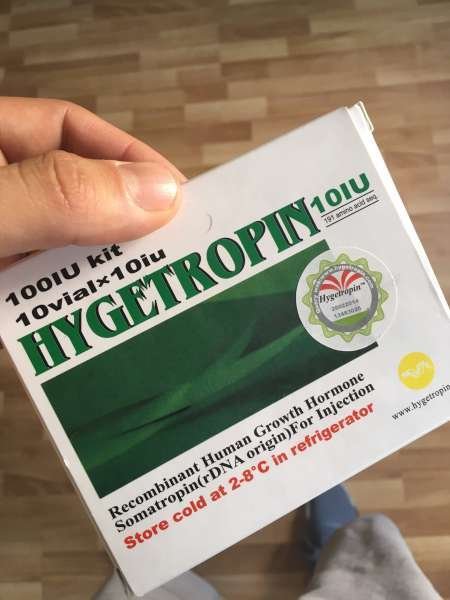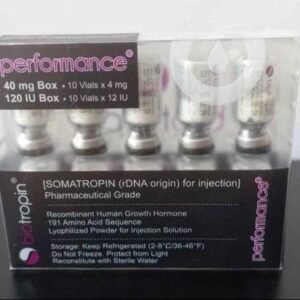Understanding Hygetropin: The Recombinant Human Growth Hormone
What is Hygetropin?
Hygetropin is a synthetic form of recombinant human growth hormone (rhGH) that closely mimics the natural growth hormone produced by the pituitary gland. It is designed to replicate the physiological effects of endogenous growth hormone, playing a crucial role in growth, metabolism, and the regulation of body composition. The synthesis of Hygetropin involves advanced biotechnology processes where the gene responsible for producing human growth hormone is inserted into bacterial or mammalian cells, enabling these cells to produce the hormone in large quantities. The resulting product is then purified for medical and therapeutic use.
This recombinant human growth hormone is essential for various biological functions, including stimulating growth during childhood and adolescence. In adults, Hygetropin contributes to the maintenance of healthy body composition by promoting protein synthesis, fat metabolism, and bone density. The hormone influences the metabolic processes that help manage energy levels, muscle mass, and fat distribution in the body. Moreover, Hygetropin is known for its ability to boost athletic performance and improve recovery from injury, making it appealing not only to individuals with growth hormone deficiencies but also to athletes seeking to enhance their physical capabilities.
The use of Hygetropin has expanded beyond treating growth hormone deficiencies in children and adults to include applications in anti-aging therapies and bodybuilding. Nevertheless, it is important to note that along with its potential benefits, the use of synthetic growth hormone like Hygetropin also carries risks, including hormonal imbalances and side effects associated with its misuse. Therefore, anyone considering the use of Hygetropin should consult healthcare professionals to ensure it aligns with their health needs and goals.
The Benefits of Hygetropin
Hygetropin, a form of recombinant human growth hormone, has garnered significant attention due to its wide array of potential benefits. One of the most notable effects of Hygetropin is its ability to promote muscle growth and repair. This is particularly advantageous for athletes and bodybuilders who seek to enhance their physical capabilities. By increasing nitrogen retention in muscles, Hygetropin encourages protein synthesis, leading to improved muscle mass and strength.
Another compelling benefit of Hygetropin is its role in fat loss. Hormones such as growth hormone facilitate the utilization of body fat as a source of energy. Users often report a decrease in body fat percentage, allowing for better muscle definition. The fat-burning effects are often accompanied by an increase in lean tissue, making it a popular choice among individuals who aim to achieve a more toned physique.
Hygetropin also contributes to improved recovery times after strenuous physical activity. The growth hormone promotes the healing of muscle fibers and reduces the time required for recovery between workouts. This is crucial for athletes who engage in high-intensity training, as it allows them to train more frequently without experiencing excessive fatigue or injury.
Moreover, Hygetropin may enhance energy levels and increase overall endurance. Users frequently report a boost in stamina, which can enhance performance in both competitive settings and daily activities. The invigorating effects make it appealing for those seeking to maintain a high level of activity throughout their day.
Lastly, Hygetropin is explored in anti-aging therapies, as it may improve skin elasticity and overall vitality in aging individuals. By upregulating cellular regeneration, it helps delay some of the aging processes. Additionally, it is utilized in various medical contexts, including pediatric growth disorders and muscle-wasting diseases, demonstrating its versatility beyond fitness applications.
How Hygetropin is Administered
Hygetropin, a form of recombinant human growth hormone (HGH), is primarily administered through subcutaneous injections. This method is favored due to its ease and effectiveness in delivering the hormone into the body’s tissues. Typically, patients will be instructed to inject Hygetropin into the fatty tissue beneath the skin, often in areas such as the abdomen, thigh, or upper arm. The precise location can vary to ensure consistent absorption and to minimize discomfort. Proper hygiene must be practiced to prevent infections, including washing hands thoroughly and cleaning the injection site with alcohol swabs.
Dosage guidelines for Hygetropin vary based on individual health conditions, age, and specific treatment goals. It is essential for patients to follow the prescribed dosage carefully, usually measured in milligrams. Most guidelines suggest starting with a lower dose to assess tolerance and to gradually increase it based on medical advice. A common dosage might range from 1 to 3 IU (international units) per day, but adjustments should be made according to response and side effects noticed by the patient.
Frequency of administration is also an important factor in the successful use of Hygetropin. Healthcare professionals typically recommend daily injections to maintain stable hormone levels in the bloodstream. Varying the time of administration may be advised, but consistency is crucial for optimal outcomes. Therefore, individuals starting treatment must engage in a thorough consultation with healthcare providers before initiating use. This dialogue can help establish a tailored regimen that aligns with personal health status and desired results while minimizing risks associated with improper use of HGH.
Potential Side Effects and Risks
Hygetropin, a form of recombinant human growth hormone (rHGH), is utilized for various therapeutic purposes, yet its usage is not without potential side effects and risks. Understanding these implications is crucial for individuals considering its administration. Common side effects include joint pain, swelling, and insulin resistance. Joint pain is often reported by users, primarily affecting areas such as the knees and elbows, leading to discomfort that can hinder daily activities.
Swelling, particularly in the extremities, is another prevalent issue. This condition, medically referred to as edema, occurs due to fluid retention and can signal underlying complications related to Hygetropin usage. Insulin resistance is also a concern, as it can increase the risk of developing type 2 diabetes, a serious health condition. Individuals with pre-existing health conditions or those who are predisposed to metabolic disorders should approach the use of Hygetropin with caution.
Moreover, more serious adverse effects may arise from the misuse or overuse of Hygetropin. Such consequences include acromegaly, a condition characterized by abnormal growth of bones and tissues due to excessive GH levels. Other pressing risks involve hypertension, increased risk of certain cancers, and cardiovascular complications. While clinical studies do support the benefits of human growth hormone in specific medical contexts, the potential dangers merit close attention.
It is imperative that individuals using Hygetropin do so under strict medical supervision. Medical professionals can monitor the effects of rHGH and mitigate the likelihood of side effects through careful dosing and assessment. Engaging in self-administration or indiscriminate use of growth hormones without professional guidance can lead to detrimental health outcomes. Therefore, informed decision-making and a thorough understanding of risks are essential for any potential users of Hygetropin.
Legality and Ethical Considerations
The legal status of Hygetropin, a form of recombinant human growth hormone, varies significantly across different countries, and these variances can have profound implications for athletes and individuals considering its use. In the United States, for instance, Hygetropin is classified as a prescription medication, meaning it can only be legally obtained through a healthcare provider’s prescription. This restriction aims to ensure the drug’s proper use and to mitigate potential abuse, particularly in the realm of sports and bodybuilding.
In many European countries, regulations are similarly stringent, with Hygetropin strictly regulated under pharmaceutical laws. However, some regions may allow over-the-counter access or have more lenient laws regarding its sale and use. This discrepancy can create confusion for consumers seeking to utilize Hygetropin for legitimate medical purposes or performance enhancement. Importantly, unauthorized usage, particularly in competitive sports, often falls under the realm of doping regulations. Organizations such as the World Anti-Doping Agency (WADA) have placed Hygetropin on their list of banned substances due to its performance-enhancing properties.
The ethical considerations surrounding the use of Hygetropin in sports and bodybuilding are complex. Proponents argue that the hormone can facilitate recovery, increase muscle mass, and enhance performance. Conversely, critics contend that its use undermines the principles of fair competition and can lead to significant health risks when used outside of medical supervision. Athletes may face considerable pressure to use such substances to stay competitive, raising questions about the integrity of sports and the health implications for individuals involved.
Ultimately, the conversation surrounding Hygetropin involves multiple facets, from legal restrictions to ethical dilemmas, with substantial implications for both individual wellness and the broader sports community. As awareness increases, so too does the need for clear guidelines and responsible discourse regarding its use in various contexts.




